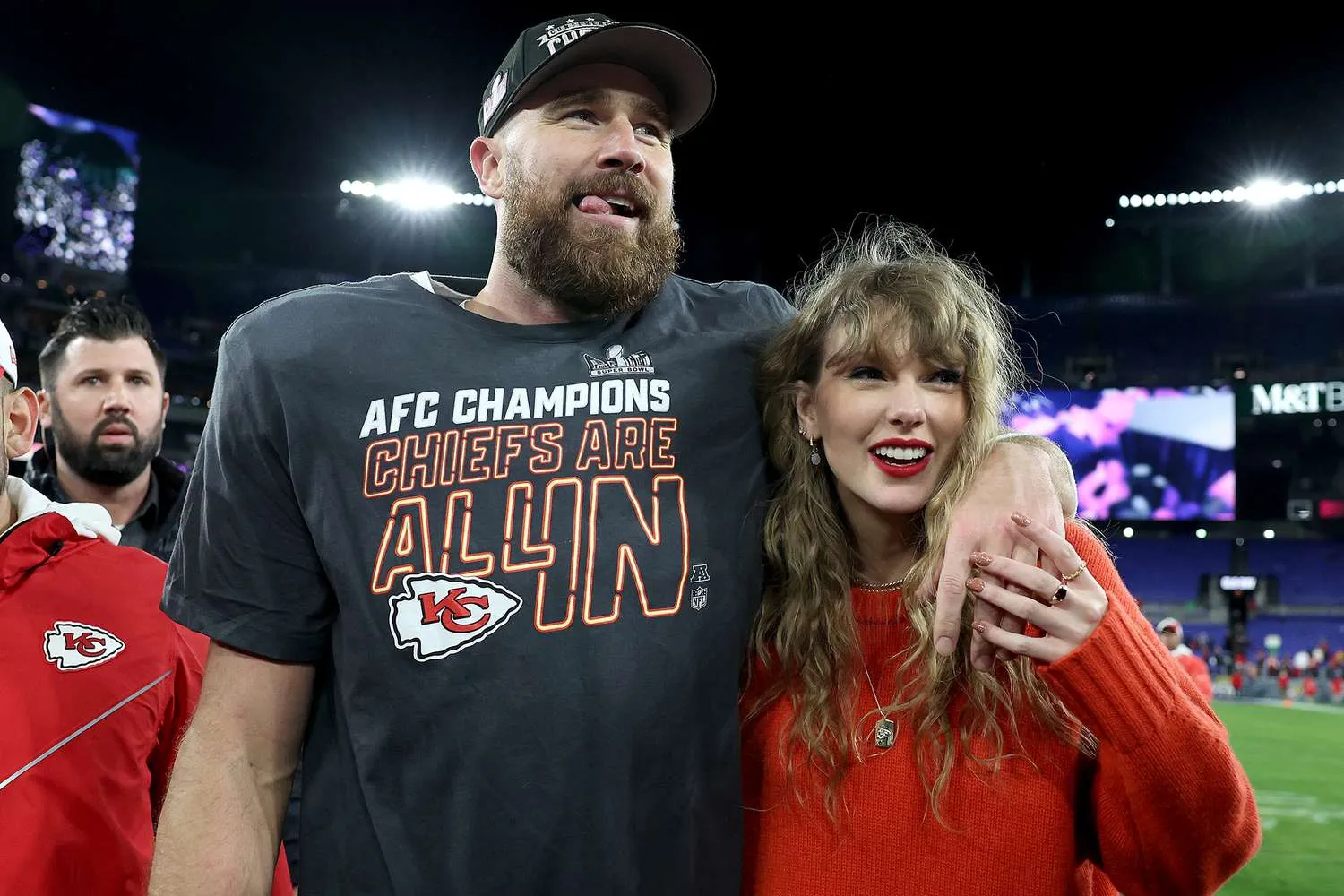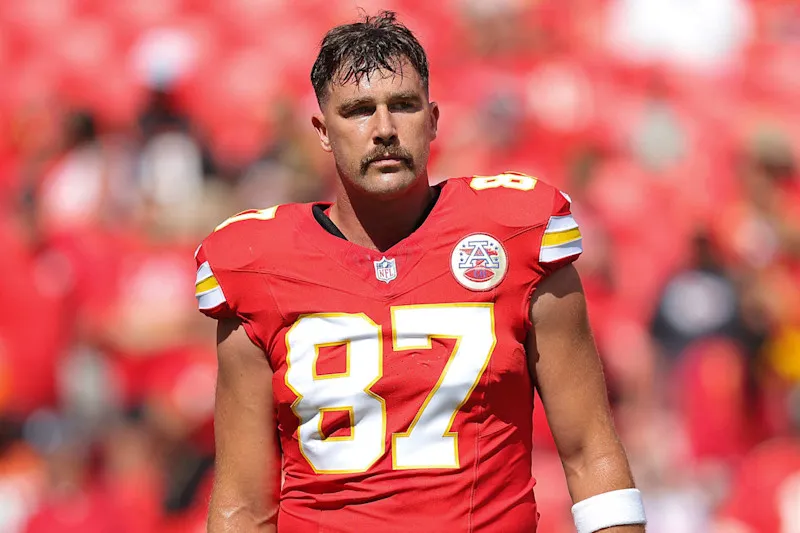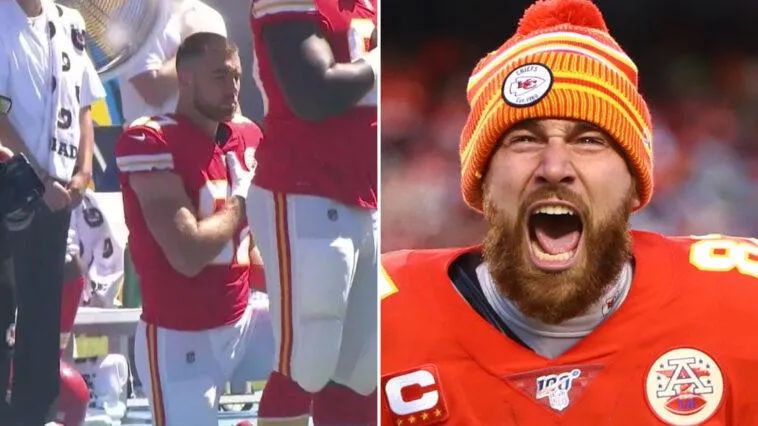Kansas City Chiefs tight end Travis Kelce has sparked a huge controversy after being fined a record $10 million for kneeling during the national anthem at an NFL game. The act of protest, reminiscent of Colin Kaepernick’s actions in 2016, has sparked an intense debate about the relationship between sports, politics and freedom of expression in the context of American culture.

The incident occurred during a Week 8 game of the 2024 NFL season, when Travis Kelce knelt just as Colin Kaepernick did in 2016 during the national anthem, in protest against social inequalities and police brutality affecting minority communities in the United States. Over the years, athletes who have participated in similar protests have been criticized by many, while others have defended them, arguing that sport is a powerful platform to advocate for social change.

Kelce, who has been one of the NFL’s most prominent figures, had not previously shown any inclination to carry out such protests, which has surprised many of his fans and teammates. The decision to kneel, in the current context, is seen by some as a brave act of solidarity with the causes that Kaepernick had raised, while others have interpreted it as an unnecessary provocation, given the political polarization around this issue.

What has created even more of a stir is the official response from the NFL and the league’s sponsors. In an unprecedented move, the NFL imposed a $10 million fine on Travis Kelce for his protest during the national anthem, citing “rules of conduct” that prohibit behavior that could “damage the image of the league” or cause political divisions. This fine has been considered historic, as never before has a player received such a high penalty for an act of protest.
NFL officials have argued that the national anthem is a moment of unity and that actions like Kelce’s could further divide fans, many of whom already feel deeply divided on the issue of protests during the anthem. However, the decision to fine Kelce has sparked a wave of criticism, both inside and outside the sport. Many observers have pointed out that the league is acting in its commercial interests and has prioritized superficial unity over the right of players to express themselves.
The fine imposed on Travis Kelce has divided public opinion. On the one hand, those who support the athletes’ protest believe that the **NFL** is taking a repressive stance against a just cause. **Activists** and **civil rights organizations** have expressed concern that the league is punishing a player for trying to draw attention to serious issues, such as police violence and racial discrimination. **Some NFL players** have come to Kelce’s defense, claiming that the act of kneeling was a legitimate manifestation of his **right to free speech** and not a way to disregard the country or its institutions.
On the other hand, many of those who oppose protests during the national anthem consider such acts to be a **lack of respect** to national symbols and **war veterans** who fought for freedom in the United States. Kelce’s critics argue that the moment of the anthem should be reserved to show respect and that protests can detract from that symbolic act of **national unity**. For some, the fine imposed by the NFL is a necessary response to protect the **image of the league** and prevent it from becoming a political battleground.
Kelce’s act inevitably brings to mind the **protest of Colin Kaepernick**, who was the first to kneel during the national anthem in 2016 as a way of protesting police brutality and racial injustice. Kaepernick was widely criticized for his action, and was eventually **suspended without justification** and **non-renewed** by the **San Francisco 49ers**, sparking a heated controversy over freedom of expression and the relationship between **sports** and **political activism**.
While Kaepernick was a polarizing figure at the time, his protest has inspired many other athletes to use their platforms to advocate for social change. Over the years, the kneeling gesture has become a symbol of resistance and a recurring topic of discussion about the role of sports in the fight for **social justice**. The fact that Kelce, one of the most popular players in the NFL, has decided to take a similar stance has once again brought to the fore the question of **how should athletes get involved in political issues**.
The impact of Kelce’s protest extends beyond the sports arena. Major NFL sponsors, many of which have multimillion-dollar deals with the league, have also reacted with concern to Kelce’s protest. The NFL, like any other professional league, relies heavily on the support of brands and companies that seek to align themselves with an apolitical image to attract a diverse audience. Political polarization in the United States has even affected the business decisions of many brands, which avoid being associated with controversies that could alienate consumers.
Some of the NFL’s biggest sponsors have expressed support for the players’ protests, arguing that social activism is an important part of modern culture. However, others have pushed the league to take steps to ensure the sport remains focused on what really matters: the game itself. In this context, Travis Kelce’s $10 million fine appears to be a response by the NFL to the commercial interests of its sponsors and the growing demand that the league stay away from political controversies.
The Travis Kelce case underscores the growing intersection between sports and politics, a topic that has become increasingly relevant in recent decades. The NFL’s stance on protests during the national anthem could have significant implications for the future of activism in sports. As athletes continue to use their platforms to voice their opinions on social and political issues, sports leagues are faced with a dilemma: allow for free speech on the field, or maintain a neutral stance and protect business interests?
Kelce’s decision to kneel and the NFL’s response underscore the complexities of this debate. As sports and politics continue to intertwine, it will be interesting to watch how leagues and athletes navigate the tensions between social activism and commercialism. Travis Kelce’s gesture could be just the beginning of a new chapter in the relationship between sports and politics in the United States, with lasting implications for freedom of speech in sports.